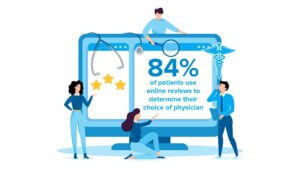In a survey on online health searches that the Pew Research Center conducted, 72% of internet users said they looked for health information online in the last year. Of those respondents, the vast majority started at a search engine like Google.
This group represents a massive pool of potential clients. But to capture any of them, you need to show up in those search results.
Proper search engine optimization, or SEO for dentists, can help. There’s no mystery in how Google creates these results. It’s a science. With a few small tweaks, you can reap the benefits of a better ranking.
Dentist SEO Starts With Link Building
Search engines build their results pages based on two factors: relevance and importance. Relevance is simple: it is the degree to which your content matches a user’s search terms and the intent of their search. Being relevant is the first step to showing up.
Importance is more complicated. Search engines determine how important a site is in the same way academics determine how important someone’s research is: through citations. But online, citations are links, so search engines rely on link analysis.
Link analysis can get complicated quickly, but for the purposes of dental SEO, you can boil it down to one key strategy: get authoritative or important sites to link to your site.
The more prestigious the site that links to you (that is, the more incoming links that site has), the more that link will help your SEO ranking. All links (with one exception to come) will help your SEO, but these links give you the biggest boost.
How and where those links are implemented also matters. Ideally, you want the anchor text (the blue text that makes up the hyperlink) for links to your site to include your most important keywords. Also, the links should be in relevant content and on a relevant site.
The one exception to the more links are better rule is link farming, or paying people to create fake links to your site. The suspicion of link farming is one of the fastest ways to get your site demoted in Google rankings. But link trading, or publishing a link on your site so someone will publish one on theirs, is fine. What does dentist seo success look like? It’s a combination of link building, content creation, and user experience. Finding a digital marketing agency that specializes in seo for dentists can help.
So, how do you get people to link to your site?
Publish Great Content
Search engines make their money, and a lot of it, by bringing in more users. They have an incentive to deliver content that people want to read. That means you have an incentive to provide them with the best content.
The most important part of your SEO strategy should be to think about what a human user would want, instead of trying to game the search engine. If you create good content, users will seek you out on their own, and other sites will link to your content.
In other words, the best way to get ranked by Google or other search engines is to create content that is rankworthy.
That kind of content will also help with your user interaction measures. When they rank pages, search engines look at how users behave once they find a page.
- Do users hit the back button and pick another result?
- How much time do users spend on the site?
- How many other pages on the site do they visit?
One of these important measures is the bounce rate or the percentage of users who only visit one page on a site before leaving. Creating compelling content will lower your bounce rate. Local content, for instance, can help draw users.
Users will also visit more spots on your site if you create internal links between your pages. These internal links also have another key benefit.
Make Your Site Crawler-Friendly
Search engines build their database of websites by crawling the web using automated spiders. These spiders start with seed sets of high-quality sites and then follow the links out from there to discover other pages.
If these crawlers can’t find your pages, the search engines cannot include you. If you want to remove all doubt, you can always submit pages to Google manually. But there are ways you can structure your site that should make that unnecessary.
One thing you want to do is create a flat site to minimize link depth. Link depth is how many clicks it takes to get from the homepage to a given page on the site. Both crawlers and human users assume pages close to the homepage are more important.
Cross-links between your content can also help the crawlers. Once they find one of your pages, these cross-links will lead them to the rest.
Also, crawlers have trouble reading images. That is why you always want to include an alt attribute for all of your images. Otherwise, the crawlers will ignore any of your relevant pictures.
Think Carefully About Your Domain
Your website domain sends a signal to your potential customers. There are certain tips you want to follow to pick the best one possible:
- Make it unique: never pick one that is just a plural, misspelled, or hyphenated version of another one
- Choose only .com domains
- Make it easy to type and remember
- Avoid hyphens and numbers
For search engine rankings, you want to avoid subdomains as much as possible. Search engines will treat these as separate sites, so you will be competing with yourself for link authority and rankings.
Instead of subdomains, use subdirectories instead. Then, your single domain will build link authority instead of splitting it between subdomains.
Proper Keyword Placement
Search engines have gotten sophisticated enough that keyword stuffing won’t work anymore. In fact, keyword stuffing can indicate to search engines that your pages are low-quality, which will hurt your rankings.
Instead of forcing in as many keywords as possible, you’re better off writing naturally and using synonyms where appropriate. Again, think about what a human user would want.
Still, keywords are important to show that your content is relevant to a user’s question. As such, it’s important to include your most relevant keywords in a few key places:
- HTML title tags
- Page-level URLs, if possible
- Page titles and headers
Include keywords in the body content as well but, as we mentioned, write naturally rather than trying to shoehorn in more keywords.
Grow Your Business Traffic
No matter how small an area you are targeting, there are too many other dentists online for you to leave things to chance. The right SEO for dentists can bring in more business with only a few small changes to your present site. If you don’t grab those results, your competition will.
If you’re ready to maximize your traffic, online and off, browse some of our marketing services. The other posts on our blog can offer more tips to enhance your marketing.





